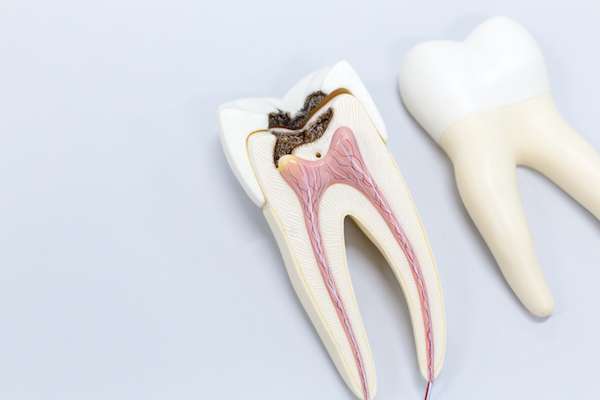Anatomy of a tooth
Each tooth is made up of four layers of tissues. Three of these layers, including the enamel, dentin, and cementum, are hard substances that cover and protect various parts of the tooth. The fourth type is called the pulp, and it is a soft tissue that contains nerves and blood vessels. The pulp chamber is responsible for helping the root of a tooth grow during development.
After a tooth is fully developed, it can survive without the pulp because it receives nutrients from surrounding tissues. For this reason, the tooth does not become "dead" following a root canal treatment.
4 steps to root canal treatment
A general dentist recommends root canal treatment as an effective way to save a tooth rather than removing it. Below are the four steps followed during a root canal.
1. X-rays
First, the dental professional takes X-rays of the tooth and surrounding bone. This provides a clear picture of the structure and condition of the tooth. After the X-rays are completed, a dental dam is placed to protect the site from saliva and keep it clean.
2. Pulpectomy
Using a small drill, an opening is created at the top of the tooth to access the dental pulp. Small files are used to extract the damaged pulp and shape the interior of the tooth. The dental professional may irrigate the tooth chamber to ensure the area is clear of infection. An antimicrobial solution is often used to kill bacteria in the tooth to prevent further infection.
3. Filling
Once the interior of the tooth is cleaned and dried, a material, called gutta-percha, is used to fill the tooth. The opening is then closed with a temporary filling. The patient schedules a follow-up appointment to allow time for healing and for a permanent crown to be made.
4. Permanent Crown
After several weeks, the general dentist places a permanent crown over the tooth. If the crown needs additional support, a metal post may be placed inside the tooth to make it more stable.
Conclusion
Though a root canal involves removing the nerves from inside a tooth, the tooth continues to function as normal. The nerves play an insignificant role in a fully developed tooth; thus, the tooth is still alive. A root canal is a beneficial treatment that saves a tooth from extraction and allows a patient to maintain a healthy smile. A patient who practices good oral care and visits a general dentist regularly can expect a restored tooth to last a lifetime.
Request an appointment or call Salud Dental Group at 505-608-7517 for an appointment in our Albuquerque office.
Related Posts
Considering cosmetic dental work from a general dentist? Although cosmetic dentistry is its own field, general dentists also offer an array of procedures that can be used to improve the way that the teeth look. There are a lot of different procedures that can be performed in a general dentistry setting. Keep reading to find…
Persistent oral pain or extensive decay may send a patient to a general dentist, who must then advise whether the patient should try to save the tooth or have it pulled. To save the tooth, a root canal procedure may be necessary. This involves removing the infected pulp of the tooth and replacing it with…
A general dentist may recommend a mouthguard to protect the teeth from damage that can occur from teeth grinding, sports injuries, or physically strenuous jobs. Grinding can be difficult to treat, but a patient can be helped by a thin mouthguard on the upper or lower teeth to prevent friction from occurring. Other types of…
